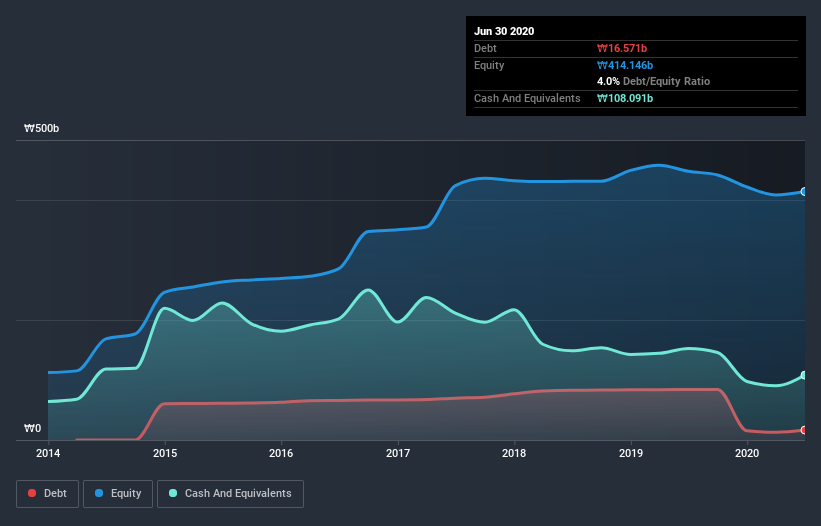- South Korea
- /
- Entertainment
- /
- KOSDAQ:A122870
Health Check: How Prudently Does YG Entertainment (KOSDAQ:122870) Use Debt?
Legendary fund manager Li Lu (who Charlie Munger backed) once said, 'The biggest investment risk is not the volatility of prices, but whether you will suffer a permanent loss of capital.' So it might be obvious that you need to consider debt, when you think about how risky any given stock is, because too much debt can sink a company. Importantly, YG Entertainment Inc. (KOSDAQ:122870) does carry debt. But the more important question is: how much risk is that debt creating?
Why Does Debt Bring Risk?
Debt assists a business until the business has trouble paying it off, either with new capital or with free cash flow. In the worst case scenario, a company can go bankrupt if it cannot pay its creditors. However, a more usual (but still expensive) situation is where a company must dilute shareholders at a cheap share price simply to get debt under control. By replacing dilution, though, debt can be an extremely good tool for businesses that need capital to invest in growth at high rates of return. The first thing to do when considering how much debt a business uses is to look at its cash and debt together.
Check out our latest analysis for YG Entertainment
How Much Debt Does YG Entertainment Carry?
The image below, which you can click on for greater detail, shows that YG Entertainment had debt of ₩16.6b at the end of June 2020, a reduction from ₩84.2b over a year. But it also has ₩108.1b in cash to offset that, meaning it has ₩91.5b net cash.

How Healthy Is YG Entertainment's Balance Sheet?
Zooming in on the latest balance sheet data, we can see that YG Entertainment had liabilities of ₩69.8b due within 12 months and liabilities of ₩20.6b due beyond that. Offsetting these obligations, it had cash of ₩108.1b as well as receivables valued at ₩27.6b due within 12 months. So it actually has ₩45.3b more liquid assets than total liabilities.
This short term liquidity is a sign that YG Entertainment could probably pay off its debt with ease, as its balance sheet is far from stretched. Simply put, the fact that YG Entertainment has more cash than debt is arguably a good indication that it can manage its debt safely. When analysing debt levels, the balance sheet is the obvious place to start. But ultimately the future profitability of the business will decide if YG Entertainment can strengthen its balance sheet over time. So if you want to see what the professionals think, you might find this free report on analyst profit forecasts to be interesting.
In the last year YG Entertainment had a loss before interest and tax, and actually shrunk its revenue by 12%, to ₩235b. We would much prefer see growth.
So How Risky Is YG Entertainment?
Statistically speaking companies that lose money are riskier than those that make money. And the fact is that over the last twelve months YG Entertainment lost money at the earnings before interest and tax (EBIT) line. Indeed, in that time it burnt through ₩11b of cash and made a loss of ₩9.0b. With only ₩91.5b on the balance sheet, it would appear that its going to need to raise capital again soon. Overall, its balance sheet doesn't seem overly risky, at the moment, but we're always cautious until we see the positive free cash flow. When we look at a riskier company, we like to check how their profits (or losses) are trending over time. Today, we're providing readers this interactive graph showing how YG Entertainment's profit, revenue, and operating cashflow have changed over the last few years.
When all is said and done, sometimes its easier to focus on companies that don't even need debt. Readers can access a list of growth stocks with zero net debt 100% free, right now.
If you decide to trade YG Entertainment, use the lowest-cost* platform that is rated #1 Overall by Barron’s, Interactive Brokers. Trade stocks, options, futures, forex, bonds and funds on 135 markets, all from a single integrated account. Promoted
New: Manage All Your Stock Portfolios in One Place
We've created the ultimate portfolio companion for stock investors, and it's free.
• Connect an unlimited number of Portfolios and see your total in one currency
• Be alerted to new Warning Signs or Risks via email or mobile
• Track the Fair Value of your stocks
This article by Simply Wall St is general in nature. It does not constitute a recommendation to buy or sell any stock, and does not take account of your objectives, or your financial situation. We aim to bring you long-term focused analysis driven by fundamental data. Note that our analysis may not factor in the latest price-sensitive company announcements or qualitative material. Simply Wall St has no position in any stocks mentioned.
*Interactive Brokers Rated Lowest Cost Broker by StockBrokers.com Annual Online Review 2020
Have feedback on this article? Concerned about the content? Get in touch with us directly. Alternatively, email editorial-team@simplywallst.com.
About KOSDAQ:A122870
YG Entertainment
Operates as an entertainment company in South Korea, Japan, and internationally.
Flawless balance sheet with solid track record.
Market Insights
Community Narratives



